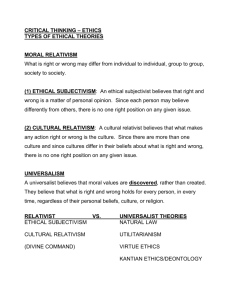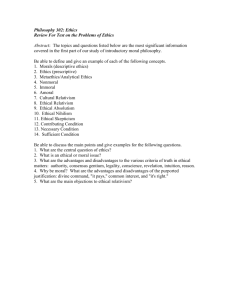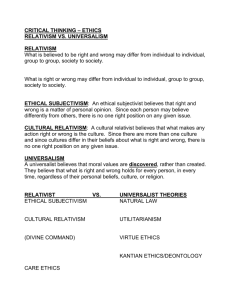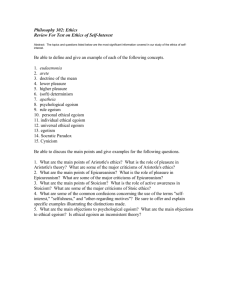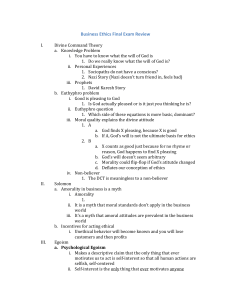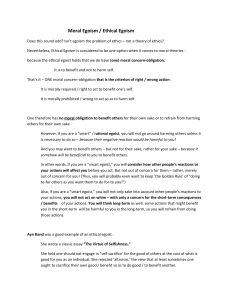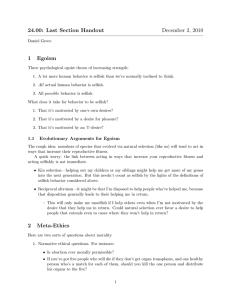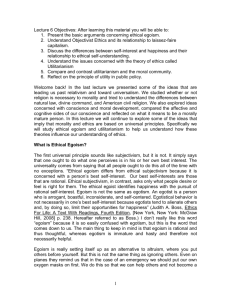Ethical Challenges
advertisement
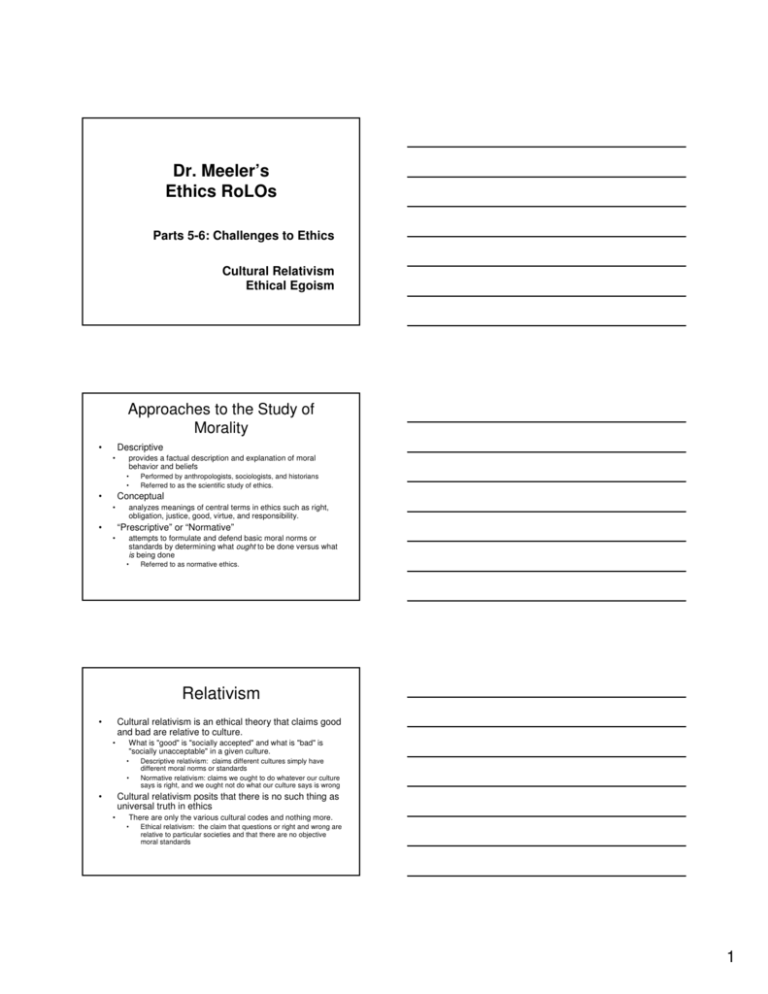
Dr. Meeler’s Ethics RoLOs Parts 5-6: Challenges to Ethics Cultural Relativism Ethical Egoism Approaches to the Study of Morality • Descriptive • provides a factual description and explanation of moral behavior and beliefs • • • Performed by anthropologists, sociologists, and historians Referred to as the scientific study of ethics. Conceptual • • analyzes meanings of central terms in ethics such as right, obligation, justice, good, virtue, and responsibility. “Prescriptive” or “Normative” • attempts to formulate and defend basic moral norms or standards by determining what ought to be done versus what is being done • Referred to as normative ethics. Relativism • Cultural relativism is an ethical theory that claims good and bad are relative to culture. • What is "good" is "socially accepted" and what is "bad" is "socially unacceptable" in a given culture. • • • Descriptive relativism: claims different cultures simply have different moral norms or standards Normative relativism: claims we ought to do whatever our culture says is right, and we ought not do what our culture says is wrong Cultural relativism posits that there is no such thing as universal truth in ethics • There are only the various cultural codes and nothing more. • Ethical relativism: the claim that questions or right and wrong are relative to particular societies and that there are no objective moral standards 1 Response to Relativism • Apparent disagreements regarding ethical issues are often attributable to different judgments rather than to different underlying moral principles. • An argument against cultural relativism is that there are some basic moral principles that all societies will have in common, because those rules are necessary for society to exist. – Even when the disagreements reflect differences in principles, this by itself is not a sufficient basis to reject the objectivity of beliefs – Furthermore, relativism is incompatible with core beliefs such as that slavery is wrong no matter what a culture may believe. • Relativists say slavery is morally right in cultures with slavery Methods to Ease Moral Disagreements • Obtaining objective information • • Make sure you have the facts straight Definitional clarity • • • Ensure we mean the same thing by terms like “Affirmative Action” Use Examples & counterexamples Analysis of arguments and positions • Done rationally, without inappropriate emotion, is the best way to resolve moral disagreement Problem of Egoism • Many people see business as only selfinterested – Promoting its own interest in a context of competition • “Look out for yourself only” • 2 types of Egoism – Psychological Egoism – Ethical Egoism 2 2 Types of Egoism • Psychological egoism (is descriptive only) – – • Ethical egoism (is prescriptive, or normative) – – – – • says everyone, in fact, is always motivated to act in his or her own perceived self-interest. A main argument against psychological egoism is that there may be no purely altruistic moral motivation to help other people unless there is personal gain An ethical theory stating that the only valid standard of conduct is the obligation to promote one's own well being above everyone else's. I.e., everyone ought to act in their own self-interest Ethical egoists believe that people should not be their brother’s keeper, because people do not completely understand the true needs of others. A main argument against ethical egoism is that it cannot provide solutions for conflict of interest, because everyone is looking out for only their own needs. Egoists believe that short-term sacrifices may be necessary for long-term self-interest. Adam Smith • Adam Smith is often cited as having egoist sympathies – Smith said if we pursue self-interest, we automatically (like by an invisible hand) promote the overall welfare of society. • Smith said egoism leads to “utilitarian” outcomes – The most benefits for the most people • We’ll talk about this idea later as we study “Normative Theories” in more detail 3
